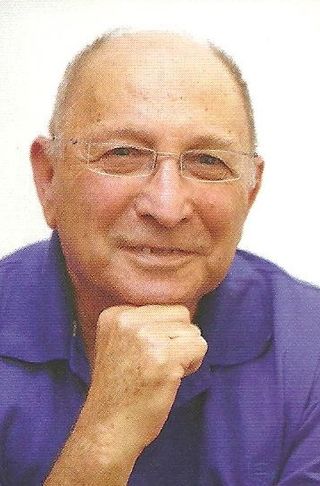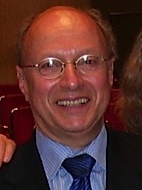Related Research Articles

John Louis Esposito is an American academic, professor of Middle Eastern and religious studies, and scholar of Islamic studies, who serves as Professor of Religion, International Affairs, and Islamic Studies at Georgetown University in Washington, D.C. He is also the founding director of the Prince Alwaleed Center for Muslim–Christian Understanding at Georgetown.

Middle Eastern studies is a name given to a number of academic programs associated with the study of the history, culture, politics, economies, and geography of the Middle East, an area that is generally interpreted to cover a range of nations including Egypt, Iran, Iraq, Israel, Jordan, Lebanon, Oman, Palestine, Saudi Arabia, Syria, Turkey, and Yemen. It is considered a form of area studies, taking an overtly interdisciplinary approach to the study of a region. In this sense Middle Eastern studies is a far broader and less traditional field than classical Islamic studies.
Francis Edward Peters, SJ, was an American academic. He served as professor emeritus of history, religion and Middle Eastern and Islamic studies at New York University (NYU). He died on April 30, 2020 in hospice in Schenectady, N.Y..

Oriental studies is the academic field that studies Near Eastern and Far Eastern societies and cultures, languages, peoples, history and archaeology. In recent years, the subject has often been turned into the newer terms of Middle Eastern studies and Asian studies. Traditional Oriental studies in Europe is today generally focused on the discipline of Islamic studies, and the study of China, especially traditional China, is often called Sinology. The study of East Asia in general, especially in the United States, is often called East Asian studies.

The Sudanese Communist Party is a communist party in Sudan. Founded in 1946, it was a major force in Sudanese politics in the early post-independence years, and was one of the two most influential communist parties in the Arab world, the other being the Iraqi Communist Party.

Wael B. Hallaq is the Avalon Foundation Professor in the Humanities at Columbia University, where he has been teaching ethics, law, and political thought since 2009. He is considered a leading scholar in the field of Islamic legal studies, and has been described as one of the world's leading authorities on Islamic law.
Secularism—that is, the separation of religion from civic affairs and the state—has been a controversial concept in Islamic political thought, owing in part to historical factors and in part to the ambiguity of the concept itself. In the Muslim world, the notion has acquired strong negative connotations due to its association with removal of Islamic influences from the legal and political spheres under foreign colonial domination, as well as attempts to restrict public religious expression by some secularist nation states. Thus, secularism has often been perceived as a foreign ideology imposed by invaders and perpetuated by post-colonial ruling elites, and is frequently understood to be equivalent to irreligion or anti-religion.
Yvonne Yazbeck Haddad is Professor of the History of Islam and Christian–Muslim Relations at the Prince Alwaleed Center for Muslim–Christian Understanding at Georgetown University. Her interests and focus include contemporary Islam; intellectual, social and political history in the Arab world; Islam in the West; Quranic Exegesis; and gender and Islam. Haddad's current research focuses on Muslims in the West and on Islamic Revolutionary Movements. She has published extensively in the field of Islamic studies.

Haggai Erlich is professor emeritus at Tel Aviv University and an academic adviser at the Open University of Israel where he is the head of Middle Eastern History studies. He is the Landau Prize recipient for 2010 in African Studies.

Ira M. Lapidus is an Emeritus Professor of Middle Eastern and Islamic History at The University of California at Berkeley. He is the author of A History of Islamic Societies, and Contemporary Islamic Movements in Historical Perspective, among other works.
Bourguibism refers to the policies of Habib Bourguiba, the first President of Tunisia, and his followers.

Ehud R. Toledano is professor of Middle East history at Tel Aviv University and the current director of the Program in Ottoman & Turkish Studies. His areas of specialization are Ottoman history, and socio-cultural history of the modern Middle East.
Natana J. DeLong-Bas is an American academic, scholar of Middle Eastern and Islamic studies, and author of a number of academic publications on Islam on the subjects of Saudi Arabia and Wahhabism, Islamic thought and history, Islam and politics, and contemporary jihadism.
Su'ad al-Fatih Mohammed al-Badawi was a Sudanese academic, politician, and journalist. She was known both for her advocacy of women's rights and for her support of Islamism.

South Sudanese nationality law is regulated by the Constitution of South Sudan, as amended; the South Sudanese Nationality Act and Nationality Regulations, and their revisions; and various international agreements to which the country is a signatory. These laws determine who is, or is eligible to be, a national of South Sudan. The legal means to acquire nationality, formal legal membership in a nation, differ from the domestic relationship of rights and obligations between a national and the nation, known as citizenship. Nationality describes the relationship of an individual to the state under international law, whereas citizenship is the domestic relationship of an individual within the nation. In South Sudan, nationality is often equated with ethnicity, despite recognition of the legal definitions. South Sudanese nationality is typically obtained under the principle of jus soli, i.e. by birth in South Sudan, or jus sanguinis, born to parents with South Sudanese ancestry. It can be granted to persons with an affiliation to the country, or to a permanent resident who has lived in the country for a given period of time through naturalization.
William Stephen Howard is an American sociologist. His studies and work focus upon social change in Africa and social movements within the Muslim world. He has written about his experiences with the Muslim community in Sudan. Howard is a professor and an associate director of graduate studies at Ohio University. He works within the School for Media Arts and Studies in the Scripps College of Communications.

Nehemia Levtzion was an Israeli scholar of African history, Near East, Islamic, and African studies, and the President of the Open University of Israel from 1987 to 1992 and the Executive Director of the Van Leer Jerusalem Institute from 1994 to 1997.
John Edward Philips is an American historian. He is a retired Professor of International Society, Hirosaki University of Japan, with many works on African history. After taking his PhD in history at UCLA in 1992, he taught at several universities in Japan, especially Hirosaki University (1997-2018) and Akita Keizaihoka University (1988-1997). Since retiring in 2018, he has been an adjunct professor in several universities in Nigeria.

Sudanese nationality law is regulated by the Constitution of Sudan, as amended; the Sudanese Nationality Law, and its revisions; and various international agreements to which the country is a signatory. These laws determine who is, or is eligible to be, a national of Sudan. The legal means to acquire nationality, formal legal membership in a nation, differ from the domestic relationship of rights and obligations between a national and the nation, known as citizenship. Nationality describes the relationship of an individual to the state under international law, whereas citizenship is the domestic relationship of an individual within the nation. In Sudan, nationality is often equated with ethnicity, despite recognition of the legal definitions. Sudanese nationality is typically obtained under the principle of jus soli, i.e. by birth in Sudan, or jus sanguinis, born to parents with Sudanese nationality. It can be granted to persons with an affiliation to the country, or to a permanent resident who has lived in the country for a given period of time through naturalization.
Rex Seán O'Fahey was an Irish historian specializing in Islamic Africa. He was especially known for his work on Sudan and on Sufism.
References
- 1 2 "John O. Voll". ACMCU. 2019. Retrieved 2021-09-03.
- ↑ Reviews of Islam: Continuity and Change in the Modern World:
- International Journal of Middle East Studies , Volume 28 , Issue 1 , February 1996 , pp. 118 - 119
- The American Historical Review, Volume 88, Issue 4, October 1983, Pages 1030–1031
- Middle Eastern Studies, Vol. 22, No. 2 (Apr., 1986), pp. 293-297
- Journal for the Scientific Study of Religion, Vol. 23, No. 2 (Jun., 1984), pp. 212-213
- Bulletin of the School of Oriental and African Studies, University of London, Vol. 48, No. 2 (1985), pp. 350-351
- Middle East Studies Association Bulletin, Vol. 17, No. 2 (December 1983), p. 198
- Journal of the American Oriental Society, Vol. 104, No. 3 (Jul. - Sep., 1984), pp. 594-595
- The International Journal of African Historical Studies, Vol. 16, No. 4 (1983), pp. 683-687
- Middle East Journal, Vol. 37, No. 2 (Spring, 1983), pp. 283-284